|
|
|
Sort Order |
|
|
|
Items / Page
|
|
|
|
|
|
|
| Srl | Item |
| 1 |
ID:
103364
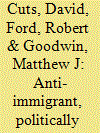

|
|
|
|
|
| Publication |
2011.
|
| Summary/Abstract |
The elections to the European Parliament (EP) held in June 2009 marked a breakthrough for the extreme right British National Party (BNP), while in other European states extreme right parties (ERPs) similarly made gains. However, the attitudinal drivers of support for the BNP and ERPs more generally remain under-researched. This article draws on unique data that allow unprecedented insight into the attitudinal profile of ERP voters in Britain - an often neglected case in the wider literature. A series of possible motivational drivers of extreme right support are separated out: racial prejudice, anti-immigrant sentiment, protest against political elites, Euroscepticism, homophobia and Islamophobia. It is found that BNP support in the 2009 EP elections was motivationally diverse, with racist hostility, xenophobia and protest voting all contributing significantly to BNP voting. The analysis suggests that the BNP, which has long been a party stigmatised by associations with racism and violent extremism, made a key breakthrough in 2009. While racist motivations remain the strongest driver of support for the party, it has also begun to win over a broader coalition of anti-immigrant and anti-elite voters.
|
|
|
|
|
|
|
|
|
|
|
|
|
|
|
|
| 2 |
ID:
193269
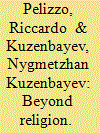

|
|
|
|
|
| Summary/Abstract |
By equating the traditional mindset with traditional beliefs (in magic, ritual, superstitions, etc.), several studies have consistently shown that such beliefs significantly influence people's political behavior and preferences. While these studies have highlighted the political consequences of a traditional mindset in several countries from the Global South, they nevertheless have little to say as to whether holding superstitious beliefs (e.g., believing in fortune tellers, horoscopes, or lucky charms) has certain political implications for countries in the Global North. In this article, we explore whether the traditional mindset has political consequences even in an industrially advanced Germany. We present an analysis of data from the German General Social Survey (GESIS 2019) showing that superstitious voters have less trust in the political system, are more inclined to think that Hitler would be remembered as a good stateman if he had not perpetrated the Holocaust, that the Nazi regime also had a good side, and that the Jews are different and, in any case, have too much influence. Hence, dissemination of superstitious beliefs could make right-wing populists more electorally appealing and successful than they once were. We believe our findings to be of some importance as they show that if the proliferation of superstitious beliefs continues unchecked, they may transform our political systems in ways that policy makers and democratic forces should strive to avoid.
|
|
|
|
|
|
|
|
|
|
|
|
|
|
|
|
| 3 |
ID:
129384
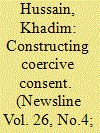

|
|
|
|
|
| Publication |
2014.
|
| Summary/Abstract |
Through manipulative tactics, the alliance of the extreme right and the militants has permeated the national discourse and seems to be moving form social control to state control of Pakistan.
|
|
|
|
|
|
|
|
|
|
|
|
|
|
|
|
| 4 |
ID:
171671
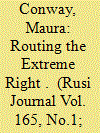

|
|
|
|
|
| Summary/Abstract |
Between 2014 and 2017, the Islamic State maintained vibrant communities on a range of social media platforms. Due to aggressive account and content takedown policies by the major platforms, these visible communities are now almost non-existent. Following the March 2019 Christchurch attack, the question as to why major platforms cannot rout the extreme right in the same way has repeatedly arisen. In this article, Maura Conway explores why this is not as straightforward as it may seem.
|
|
|
|
|
|
|
|
|
|
|
|
|
|
|
|
| 5 |
ID:
111505
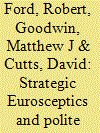

|
|
|
|
|
| Publication |
2012.
|
| Summary/Abstract |
While Euroscepticism is the most important driver of United Kingdom Independence Party (UKIP) support, other attitudinal drivers - namely dissatisfaction towards mainstream parties and xenophobia - are also important. Examining vote-switching between first- and second-order elections evidence is found of a distinction between two types of supporter: more affluent and middle-class 'strategic defectors' from the mainstream Conservative Party who support UKIP to register their Euroscepticism, and more economically marginal and politically disaffected 'core loyalists' who are attracted to UKIP by its anti-immigration rhetoric and populist anti-establishment strategy. UKIP also succeeds in attracting core support from groups such as women who have traditionally rejected extreme right parties such as the British National Party (BNP). This suggests that UKIP is well positioned to recruit a broader and more enduring base of support than the BNP.
|
|
|
|
|
|
|
|
|
|
|
|
|
|
|
|
| 6 |
ID:
141272
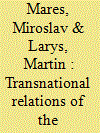

|
|
|
|
|
| Summary/Abstract |
This article describes and analyses the transnational relations of Russian extreme right entities. It classifies the Russian extreme right into categories according to their ideological orientation (ethnonationalism and civilisational nationalism) and forms of activity (political parties and interest groups, intellectuals, the autonomous neo-Nazi scene, and paramilitary formations). For each category important contacts are described in terms of the travels abroad of Russian extreme right activists, visits by foreign extremists to Russia, and the establishment of transnational organisation branches in Russia. The article concludes that although so far the Russian extreme right has mostly had ad hoc contacts abroad, it has been involved in the gradual building of stable networks.
|
|
|
|
|
|
|
|
|
|
|
|
|
|
|
|
|
|
|
|
|